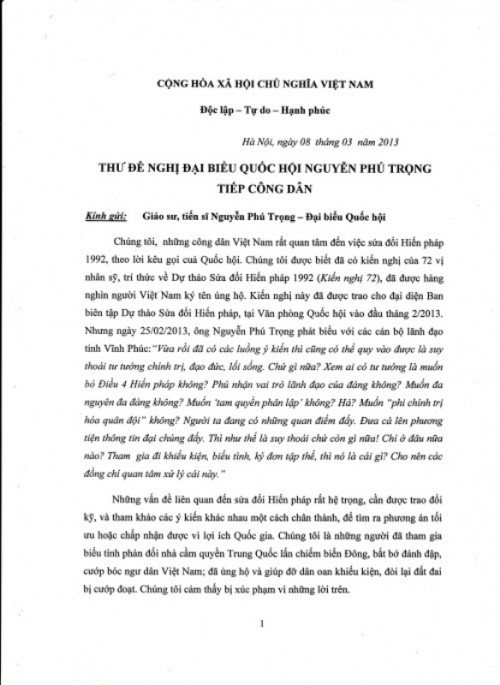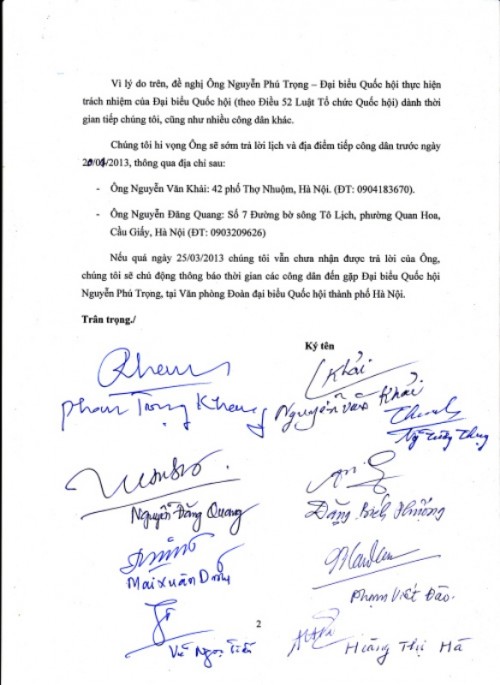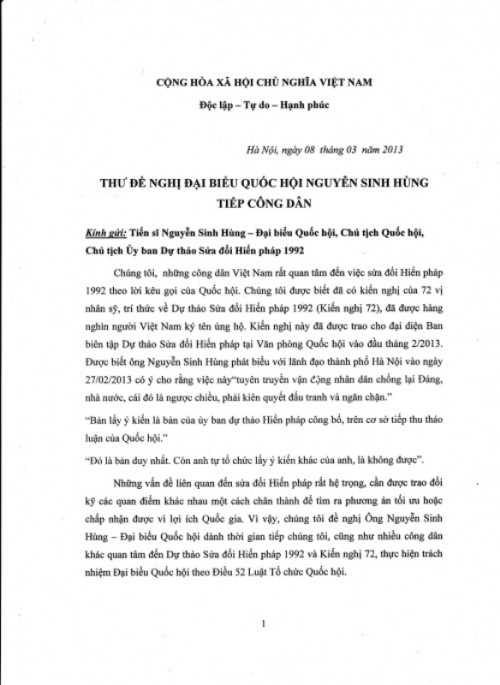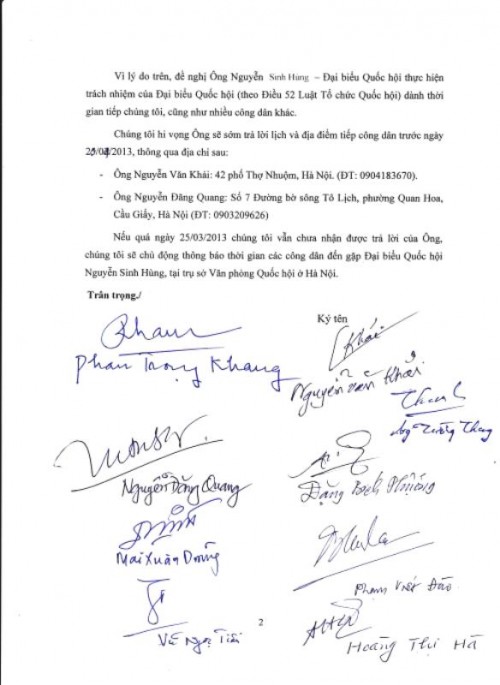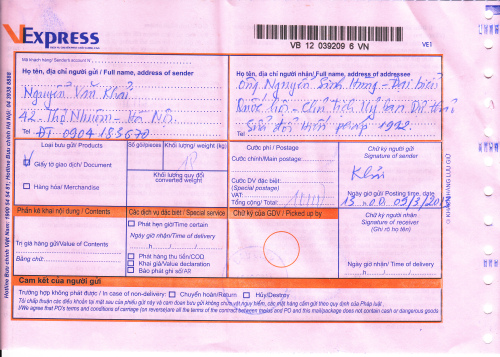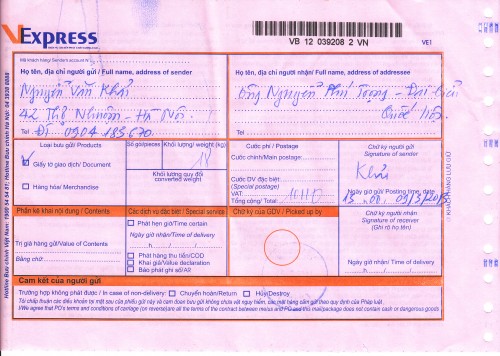Montag, 25. März 2013
Chinesische Marine macht Flottenübung auf der Südchinesischen Meer.
Hạm đội Nam Hải tập trận đổ bộ chiếm "đảo D" ở Biển Đông Ngày 22/3 đài truyền hình trung ương Trung Quốc phát phóng sự cập nhật hoạt động tập trận của Hạm đội Nam hải trên Biển Đông. Bản tin trên CCTV 13 cho biết, đợt tập trận này của Hạm đội Nam Hải hoàn toàn lấy bối cảnh thực chiến. Trước khi tấn công đổ bộ, lực lượng này đã tổ chức 12 lính trinh sát nửa đêm về sáng đột nhập "đảo D" lợi dụng đêm tối trinh sát tình hình và gửi báo cáo về tàu chỉ huy Tỉnh Cương Sơn neo đậu cách "đảo D" vài km. 2 tiếng sau, trinh sát Trung Quốc đã đột nhập được "đảo D" và báo cáo về sở chỉ huy. 8 giờ 40 phút sáng 21/3, khoảng 100 lính thủy quân lục chiến và lính dù đổ bộ đã triển khai tấn công đổ bộ lên "đảo D" bằng 2 đường không - biển. (Giaoduc)
Sonntag, 17. März 2013
Chinese navy crime at Spratly islands- 1988, you may not know!- Cuộc Thảm sát Gạc Ma 14.03.1988- Das Massaker von Gac Ma 1988
In der Erinnerung an das Massaker von Gac Ma , Truong Sa,gehört zu Spratly- Inselgruppe am 14. März 1988. Sie waren junge unbewaffnete Soldaten, und wurden mit einem Transportschiff auf die Insel gebracht.
http://m.youtube.com/#/watch?v=9fJTPPsv2fM&desktop_uri=%2Fwatch%3Fv%3D9fJTPPsv2fM&gl=DE
".....explain to me the evidence that these people on there reefs who died, are INFACT soldiers/sailors."

Chinese navy crime at Spratly islands- 1988, you may not know!
64 Vietnamese sailors had been killed by Chinese "brother" navy at spratly islands in 1988.
Video:
Nguyen Dac Kien- Critics pile on Vietnam government in rare debate
Critics pile on Vietnam government in rare debate
By By CHRIS BRUMMITT, Associated Press – Feb 28, 2013
HANOI, Vietnam (AP) — Vietnam's leaders sought to boost their flagging legitimacy by asking the public for suggestions on constitutional reform. What they got instead was rare open criticism of one-party rule, a fired journalist turned poster boy for dissent, and another lesson on how the Internet has changed the rules of governance.
The flurry of criticism has put Communist Party chiefs on the defensive, upping the pressure on them amid widespread discontent over high-level corruption and a stuttering economy. Those behind the outpouring — a grouping of intellectuals and former officials — say they have no intention of shutting up.
"Many of our fellow countrymen and soldiers have sacrificed themselves to build this current regime," said Le Hieu Dang, former vice chairman of a Communist Party-run organization in Ho Chi Minh City. "Going against the rights of the people can't be tolerated after the blood that has been shed."
Samstag, 16. März 2013
China: Tausende Polizisten greifen Dorf Shangpu an
Epoch Times Deutschland 13.03.2013

Szene nach dem Angriff der Polizei in Shangpu.
Foto: NTD Television
Mitten in der Nacht haben tausende bewaffnete Polizisten das Dorf Shangpu
in der Provinz Guangdong angegriffen. Die Bewohner hatten
demokratische Wahlen gefordert, nachdem Dorfchef Li Baoyu illegal 33
Hektar Land verkauft hatte.
Sky News reporter Mark Stone arrested in China during live report
news.com March 16, 2013 10:51AM
Video:
http://video.news.com.au/2345634731/Reporter-detained-in-China-live-on-TV
A JOURNALIST and his camera operator have been detained in Tiananmen Square live on British television, in what he described as a surreal but telling episode about reporting in China.
Viewers of the 24-hour British channel Sky News on Friday were treated to the bizarre sight of reporter Mark Stone being directed into a police van live from Beijing.
He reported live from inside the van, admitting that the Chinese officials with him - one of them filming Stone herself - probably did not realise he was speaking directly to London.
"Still in the police van, should be leaving in just a second for this rather surreal experience, which gives you a little insight into what can happen sometimes" in China, Stone said.
The team were then taken into a room where they were told to await questioning.
"We were here in Tiananmen Square filming, doing lives (live reports) through the day; now they've stopped us because of one word. We were talking about the 1989 protest, they didn't like that," Stone said.
The square is a popular tourist site near the regime's nerve centre and the scene of 1989 democracy protests that were crushed by the Chinese authorities.
A police officer was filmed asking the Sky team to switch off their camera, saying they were now inside the Forbidden City and did not have permission to film there.
Stone, who was in Beijing reporting on China's leadership transition, said the police had been "utterly civil" throughout the incident.
While they had permission to film in the square, Stone said police told him the team were not displaying their passes correctly, and noted he was not carrying his passport as required.
China's foreign ministry insists that press censorship does not exist in the country, but journalists report the constant threat of interference from government officials.
Human Rights Organizations Call on the UN to Aid Detained Vietnamese Blogger Le Quoc Quan
BY Eva Gaperin
MARCH 15, 2013
On 27 December 2012 prominent Vietnamese activist and blogger Le Quoc Quan was arbitrarily arrested and detained by local authorities while taking his daughter to school. The arrest was the culmination of years of constant surveillance and harassment over his extensive writing on civil rights, political pluralism and religious freedom for the BBC, online newspapers, and on his blog.
As a lawyer, Quan represented many victims of human rights violations, but was disbarred in 2007 on suspicion of engaging in “activities to overthrow the regime.” Despite these threats, he continued with his human rights advocacy and as a result he has been arrested several times since. In August 2012, he was hospitalized after being severely beaten near his home by unknown assailants—an assault which has not been investigated by Vietnamese authorities.
Since his latest arrest, Quan has been held incommunicado in detention at Hoa Lo No. 1 Prison, Hoan Kiem District, Hanoi, Viet Nam, and has had access to counsel only twice. No trial date has been set, and reports of a 15-day hunger strike, which has left Quan weak, raise concerns about the state of his health.
Land-grabs in Vietnam. Losing the plot
Economist
Land-grabs in Vietnam
Losing the plot
Anger rises over corrupt local officials
 Get off my land
Get off my land
THICK envelopes mailed from villages in 57 of Vietnam’s 63 provinces are piling up in Le Hien Duc’s living room. The subject of the correspondence is land. “The government is seizing it,” says Ms Duc, an 80-year-old activist and retired primary-school teacher. “They say it’s all about investing in social-welfare projects, but I call it stealing.”
Freitag, 15. März 2013
4 Signs the Vietnamese Government Is Crushing the Country's 'Social Media Revolution'
2
The Communist Party has responded to the growth of anti-state blogging with a disturbing crackdown.

After more than a year in pre-trial detention, five independent bloggers amid other activists stood in a Vietnamese court for two days in January to hear they would live behind bars for up to 13 more years. They join a growing cohort of bloggers imprisoned for "activities aimed at overthrowing the people's administration," "undermining of national unity" and committing "propaganda against the Socialist Republic of Vietnam."
Vietnamese bloggers tasted internet freedom over the last decade as online access grew, but social media is no game changer in a paranoid state. With a mix of insecurity and strength, the Communist Party is gagging dissent in Vietnam with a strategy that entails promoting self-censorship, defaming the swelling ranks of imprisoned dissidents, deploying anonymous pro-Party influencers and holding showcase purges amid a stalling economy.

Vietnamese students surf the Internet at a cafe in Hanoi March 18, 2004. (Reuters)
After more than a year in pre-trial detention, five independent bloggers amid other activists stood in a Vietnamese court for two days in January to hear they would live behind bars for up to 13 more years. They join a growing cohort of bloggers imprisoned for "activities aimed at overthrowing the people's administration," "undermining of national unity" and committing "propaganda against the Socialist Republic of Vietnam."
Vietnamese bloggers tasted internet freedom over the last decade as online access grew, but social media is no game changer in a paranoid state. With a mix of insecurity and strength, the Communist Party is gagging dissent in Vietnam with a strategy that entails promoting self-censorship, defaming the swelling ranks of imprisoned dissidents, deploying anonymous pro-Party influencers and holding showcase purges amid a stalling economy.
China’s Paid Trolls: Meet the 50-Cent Party
New Statesman
The Chinese government hires people to distort or deflect conversations on the web. Ai Weiwei persuades an “online commentator” to tell all.
BY AI WEIWEI PUBLISHED 17 OCTOBER 2012

(PHOTO: Marcus Bleasdale VII)
In February 2011, Ai Weiwei tweeted that he would like to conduct an interview with an “online commentator”. Commentators are hired by the Chinese government or the Communist Party of China to post comments favourable towards party policies and to shape public opinion on internet message boards and forums. The commentators are known as the 50-Cent Party, as they are said to be paid 50 cents for every post that steers a discussion away from anti-party content or that advances the Communist Party line.
Below is the transcript of Ai’s interview with an online commentator. As requested, an iPad was given as compensation for the interview. To protect the interviewee, relevant personal information has been concealed in this script.
Question: What’s your name, age, city of residence and online username?
Answer: I cannot make my name public. I’m 26. I have too many usernames. If I want to use one, I just register it. I won’t mention them here.
What do you call the work you do now?
It doesn’t matter what you call it: online commentator, public opinion guide, or even “the 50-Cent Party” that everyone’s heard of.
What is your level of education and work experience? How did you begin the work of guiding public opinion?
I graduated from university and studied media. I once worked for a TV channel, then in online media. I’ve always been in the news media industry, for four or five years now.Over a year ago, a friend asked me if I wanted to be an online commentator, to earn some extra money. I said I’d give it a try. Later, I discovered it was very easy.
When and from where will you receive directives for work?
Almost every morning at 9am I receive an email from my superiors – the internet publicity office of the local government – telling me about the news we’re to comment on for the day. Sometimes it specifies the website to comment on, but most of the time it’s not limited to certain websites: you just find relevant news and comment on it.
Can you describe your work in detail?
The process has three steps – receive task, search for topic, post comments to guide public opinion. Receiving a task mainly involves ensuring you open your email box every day. Usually after an event has happened, or even before the news has come out, we’ll receive an email telling us what the event is, then instructions on which direction to guide the netizens’ thoughts, to blur their focus, or to fan their enthusiasm for certain ideas. After we’ve found the relevant articles or news on a website, according to the overall direction given by our superiors we start to write articles, post or reply to comments. This requires a lot of skill. You can’t write in a very official manner, you must conceal your identity, write articles in many different styles, sometimes even have a dialogue with yourself, argue, debate. In sum, you want to create illusions to attract the attention and comments of netizens.
In a forum, there are three roles for you to play: the leader, the follower, the onlooker or unsuspecting member of the public. The leader is the relatively authoritative speaker, who usually appears after a controversy and speaks with powerful evidence. The public usually finds such users very convincing. There are two opposing groups of followers. The role they play is to continuously debate, argue, or even swear on the forum. This will attract attention from observers. At the end of the argument, the leader appears, brings out some powerful evidence, makes public opinion align with him and the objective is achieved. The third type is the onlookers, the netizens. They are our true target “clients”. We influence the third group mainly through role-playing between the other two kinds of identity. You could say we’re like directors, influencing the audience through our own writing, directing and acting. Sometimes I feel like I have a split personality.
Regarding the three roles that you play, is that a common tactic? Or are there other ways?
There are too many ways. It’s kind of psychological. Netizens nowadays are more thoughtful than before. We have many ways. You can make a bad thing sound even worse, make an elaborate account, and make people think it’s nonsense when they see it. In fact, it’s like two negatives make a positive. When it’s reached a certain degree of mediocrity, they’ll think it might not be all that bad.
What is the guiding principle of your work?
The principle is to understand the guiding thought of superiors, the direction of public opinion desired, then to start your own work.
Can you reveal the content of a “task” email?
For example, “Don’t spread rumours, don’t believe in rumours”, or “Influence public understanding of X event”, “Promote the correct direction of public opinion on XXXX”, “Explain and clarify XX event; avoid the appearance of untrue or illegal remarks”, “For the detrimental social effect created by the recent XX event, focus on guiding the thoughts of netizens in the correct direction of XXXX”.
What are the categories of information that you usually receive?
They are mainly local events. They cover over 60 to 70 per cent of local instructions – for example, people who are filing complaints or petitioning.
For countrywide events, such as the Jasmine Revolution [the pro-democracy protests that took place across the country in 2011], do you get involved?
For popular online events like the Jasmine Revolution, we have never received a related task. I also thought it was quite strange. Perhaps we aren’t senior enough.
Can you tell us the content of the commentary you usually write?
The netizens are used to seeing unskilled comments that simply say the government is great or so and so is a traitor. They know what is behind it at a glance. The principle I observe is: don’t directly praise the government or criticise negative news. Moreover, the tone of speech, identity and stance of speech must look as if it’s an unsuspecting member of public; only then can it resonate with netizens. To sum up, you want to guide netizens obliquely and let them change their focus without realising it.
Can you go off the topic?
Of course you can go off the topic. When transferring the attention of netizens and
blurring the public focus, going off the topic is very effective. For example, during the census, everyone will be talking about its truthfulness or necessity; then I’ll post jokes that appeared in the census. Or, in other instances, I would publish adverts to take up space on political news reports.
Can you tell us a specific, typical process of “guiding public opinion”?
For example, each time the oil price is about to go up, we’ll receive a notification to “stabilise the emotions of netizens and divert public attention”. The next day, when news of the rise comes out, netizens will definitely be condemning the state, CNPC and Sinopec. At this point, I register an ID and post a comment: “Rise, rise however you want, I don’t care. Best if it rises to 50 yuan per litre: it serves you right if you’re too poor to drive. Only those with money should be allowed to drive on the roads . . .”
This sounds like I’m inviting attacks but the aim is to anger netizens and divert the anger and attention on oil prices to me. I would then change my identity several times and start to condemn myself. This will attract more attention. After many people have seen it, they start to attack me directly. Slowly, the content of the whole page has also changed from oil price to what I’ve said. It is very effective.
What’s your area of work? Which websites do you comment on?Which netizens do you target?
There’s no limit on which websites I visit. I mainly deal with local websites, or work on Tencent. There are too many commentators on Sohu, Sina, etc. As far as I know, these websites have dedicated internal departments for commenting.
Can you tell which online comments are by online commentators?
Because I do this, I can tell at a glance that about 10 to 20 per cent out of the tens of thousands of comments posted on a forum are made by online commentators.
Will you debate with other people online? What sorts of conflicts do you have? How do you control and disperse emotion?
Most of the time we’re debating with ourselves. I usually never debate with netizens and I’ll never say I’ve been angered by a netizen or an event. You could say that usually when I’m working, I stay rational.
When the government says, “Don’t believe in rumours, don’t spread rumours,” it achieves the opposite effect. For example, when Sars and the melamine in milk case broke out, people tended to choose not to trust the government when faced with the choices of “Don’t trust rumours” and “Don’t trust the government”.
I think this country and government have got into a rather embarrassing situation. No matter what happens – for example, if a person commits a crime, or there’s a traffic accident – as long as it’s a bad event and it’s publicised online, there will be people who condemn the government. I think this is very strange.
This is inevitable, because the government encompasses all. When all honour is attributed to you, all mistakes are also attributed to you. Apart from targeted events, are individuals targeted? Would there be this kind of directive?
There should be. I think for the Dalai Lama, there must be guidance throughout the country. All people in China hate the Dalai Lama and Falun Gong somewhat. According to my understanding, the government has truly gone a bit over the top. Before I got involved in this circle, I didn’t know anything. So I believe that wherever public opinion has been controlled relatively well, there will always have been commentators involved.
How do your superiors inspect and assess your work?
The superiors will arrange dedicated auditors who do random checks according to the links we provide. Auditors usually don’t assess, because they always make work requirements very clear. We just have to do as they say and there won’t be any mistakes.
How is your compensation decided?
It’s calculated on a monthly basis, according to quantity and quality. It’s basically calculated at 50 yuan per 100 comments. When there’s an unexpected event, the compensation might be higher. If you work together to guide public opinion on a hot topic and several dozen people are posting, the compensation for those days counts for more. Basically, the compensation is very low. I work part-time. On average, the monthly pay is about 500-600 yuan. There are people who work full-time on this. It’s possible they could earn thousands of yuan a month.
Do you like your work?
I wouldn’t say I like it or hate it. It’s just a bit more to do each day. A bit more pocket money each month, that’s all.
What’s the biggest difficulty in the work?
Perhaps it’s that you have to guess the psychology of netizens. You have to learn a lot of writing skills. You have to know how to imitate another person’s writing style. You need to understand how to gain the trust of the public and influence their thoughts.
Why can’t you reveal your identity? Why do you think it’s sensitive?
Do you want me to lose my job? Whatever form or name we use to post on any forums or blogs is absolutely confidential. We can’t reveal our identity, and I definitely wouldn’t reveal that I’m a professional online commentator.
If we do, what would be the purpose of our existence? Exposure would affect not just me, it would create an even greater negative effect on our “superiors”.
What do you mean by “superiors”?
Our superior leaders – above that should be the propaganda department.
Is your identity known to your family? Your friends?
No. I haven’t revealed it to my family or friends. If people knew I was doing this, it might have a negative effect on my reputation.
You say: “If I reveal inside information, without exaggeration this could lead to fatality.” Do you think that the consequence would be so serious?
With my identity, I’m involved in the media and also the internet. If I really reveal my identity or let something slip, it could have an incalculable effect on me.
If you say you want to quit, will there be resistance? Are there any strings attached?
Not at all. This industry is already very transparent. For me, it’s just a part-time job. It’s like any other job. It’s not as dark as you think.
How many hours do you go online each day and on which sites? Do you rest at the weekend?
I go online for six to eight hours nearly every day. I’m mainly active on our local BBS and some large mainstream internet media and microblogs. I don’t work over weekends, but I’ll sign in to my email account and see if there’s any important instruction.
In daily life, will you still be thinking about your online work?
Now and then. For example, when I see a piece of news, I’ll think about which direction the superiors will request it to be guided in and how I would go about it. It’s a bit of an occupational hazard.
Do you watch CCTV News and read the People’s Daily?
I usually follow all the news, particularly the local news. But I generally don’t watch CCTV News, because it’s too much about harmony.
Do you go on Twitter? Who do you follow?
Yes. I follow a few interesting people, including Ai Weiwei. But I don’t speak on Twitter, just read and learn.
How big a role do you think this industry plays in guiding public opinion in China?
Truthfully speaking, I think the role is quite big. The majority of netizens in China are actually very stupid. Sometimes, if you don’t guide them, they really will believe in rumours.
Because their information is limited to begin with. So, with limited information, it’s very difficult for them to express a political view.
I think they can be incited very easily. I can control them very easily. Depending on how I want them to be, I use a little bit of thought and that’s enough. It’s very easy. So I think the effect should be quite significant.
Do you think the government has the right to guide public opinion?
Personally, I think absolutely not. But in China, the government absolutely must interfere and guide public opinion. The majority of Chinese netizens are incited too easily, don’t think for themselves and are deceived and incited too easily by false news.
Do you have to believe in the viewpoints you express? Are you concerned about politics and the future?
I don’t have to believe in them. Sometimes you know well that what you say is false or untrue. But you still have to say it, because it’s your job. I’m not too concerned about Chinese politics. There’s nothing to be concerned about in Chinese politics.
Montag, 11. März 2013
Vietnam’s Police Force to be given “License To Kill” on duty; The regime is legalizing lethal force on dissidents
Eye Dr DeLengocky - It has been a common occurrence in Vietnam that people are beaten up to death during the custody at police station. About a dozen persons are found dead yearly for minor traffic violations during the police custody. Such victims rarely get the justice they deserve as the perpetrators or police officers hide behind the protection “accidents during police duty,” who receive usually very light sentence of a few years.
In a real democracy, such occurrence of murders during the police custody, the minister of Interior or Public Security may have been forced to resign because the minister is held accountable for the actions or bad behaviors of his subordinates. In Vietnam, the minister of Public Security is unharmed by the scandalous murders and instead is further promoted to the Major General rank.
Sonntag, 10. März 2013
Ba Sàm bị tin tặc phá- Nachrichten-blog BASAM wurde gehackt.
Die vietnamesischen Miniblogs werden in dieser Zeit heftig von den Hackers angegriffen.
aktuelle neue Blog http://anhbasam04.blogspot.de/
Facebook:http://www.facebook.com/BasamVN?fref=ts
(ab 15.03.2013 ist (www.anhbasam04.wordpress.com))
aktuelle neue Blog http://anhbasam04.blogspot.de/
Facebook:http://www.facebook.com/BasamVN?fref=ts
(ab 15.03.2013 ist (www.anhbasam04.wordpress.com))
Die Nachrichten-blog BASAM wurde gehackt! Das Bild des Besitzers Nguyen Huu Vinh der Blogs Ba Sam wurde heftig angegriffen.
Samstag, 9. März 2013
KIẾN NGHỊ VỀ SỬA ĐỔI HIẾN PHÁP NĂM 1992 (KIẾN NGHỊ 72)
Thực hiện Nghị quyết của Quốc hội về việc góp ý kiến vào Dự thảo sửa đổi Hiến pháp 1992 (dưới đây gọi tắt là Dự thảo), chúng tôi, những người Việt Nam ký tên dưới đây, xin trình bày với Quốc hội và Uỷ ban Dự thảo sửa đổi Hiến pháp 1992 một số kiến nghị, đồng thời mong mỏi toàn thể đồng bào trong và ngoài nước thẳng thắn nói lên ý kiến để nhân dân ta có một Hiến pháp bảo đảm sự toàn vẹn lãnh thổ và sự phát triển bền vững của đất nước, mang lại tự do hạnh phúc cho các thế hệ hiện tại và tương lai.
Another Invasion: China Takes Spratly, 1988
Freedom for Vietnam: When the Chinese invaded Hoang Sa in 1974, the Republic of Vietnam, under the leadership of President Nguyen Van Thieu, fought with all they had. The attack ended in what is arguably a stalemate. However, since the losses of the People’s Republic of China nearly doubled that of the Republic of Vietnam, it is fair to argue that the battle was won by the South Vietnamese Navy. The South did win the battle, but they would end up losing the islands in the end. Since they used up all of their resources on the first confrontation, the Republic of Vietnam did not have enough firepower for a second. For this reason, the Chinese would return on the following day with more naval power, and complete their invasion of the Paracel Islands (Hoang Sa).
Fast forward to 1988, where a group of unarmed Vietnamese soldiers, who put up their guns to become workers on the islands of Truong Sa, were ambushed by several Chinese warships. With no fighting capabilities, the Vietnamese workers were massacred by the invading army of the PRC. This attack would be known as the “Massacre on the Spratly Islands,” where a Chinese army ruthlessly slaughters a group of unarmed Vietnamese workers. To this day, China denies these allegations, even though the proof of their crimes are well documented in books and all over the internet.
They justified the massacre by claiming that they were defending themselves against aggressive Vietnamese soldiers. How could this be? Vietnam did not have a warship present, they didn’t even have any artillery to fight back with. Regardless, China keeps persisting that they were defending themselves, unwilling to acknowledge the damning evidence of their wrongdoings. It should be interesting to note that the Chinese used the very same excuses to invade Hoang Sa in 1794, so it shouldn’t be that surprising to see them use it again. It was this attack that made Spratly fall into the hands of the Chinese, along with Hoang Sa.
It was always on China’s agenda to take both of the islands, since they had the idea of controlling all of the Southeast Asia Sea for the longest time. The big difference between the incidents in 1974 and 1988 is that the event in 1974 was a military clash, while March 14, 1988 is just a ruthless massacre of defenseless individuals. The attack in 1974 was wrong enough, invading a piece of land that is clearly not under China’s jurisdiction. However, the assault in 1988 was even worse. This time, the victims didn’t even have anything to protect themselves with! Both of the invasions were disgraceful, the latter was the most. To this day, China is still in control of Hoang Sa, while also trying to take full control of Truong Sa. It is true that the situation is bleak right now, but don’t worry. In time, when the right leader arrives, we will take it all back. With interest.
Déclaration des Citoyens vietnamiens libres
Nous, soussignés, appelons nos concitoyens à nous rejoindre pour déclarer ensemble que:
1. Nous voulons non seulement supprimer l'article 4 de la Constitution, mais aussi organiser un Congrès constitutionnel pour établir une nouvelle Constitution; celle qui reflèterait la vraie volonté de l’ensemble du peuple vietnamien, et non pas la volonté du Parti communiste telle que défend la Constitution actuelle.
2. Nous soutenons le pluralisme, le multipartisme, et tous les partis politiques qui se concurrencent loyalement pour la liberté, la démocratie, la paix et le progrès du peuple vietnamien. Aucun parti politique, quelque que soit le statut, n'aura le droit de manipuler notre nation par le totalitarisme.
3. Nous soutenons la création d’un Etat fondé non seulement sur la séparation des pouvoirs (séparation du législatif, de l’exécutif et du judiciaire), mais aussi sur la décentralisation du pouvoir gouvernemental, c’est-à-dire un système qui augmente l'autonomie des régions et établit des administrations locales fortes. Nous soutenons la suppression de grandes entreprises nationales (ou entreprises soutenues par l'État) ainsi que celle des institutions publiques qui emploient improprement le budget national, qui détournent les biens collectifs, et qui détruisent la confiance, l’esprit et la solidarité du peuple vietnamien.
4. Nous soutenons l’apolitisme de l'armée. L'existence de l’armée a pour but de protéger le peuple & la patrie, de défendre la souveraineté nationale, et non pas de servir n’importe quel parti politique.
5. Nous affirmons avoir le droit de faire la déclaration ci-présente, et que tous les autres vietnamiens possèdent le même droit. Nous sommes en train d’appliquer les droits fondamentaux de l’homme qu’il s’agit de la liberté d'expression et la liberté de pensée. Ces droits sont acquis par chaque être humain à la naissance; ils sont reconnus et respectés par le peuple vietnamien; Ces droits n’ont pas été distribués par le Parti Communiste Vietnamien, par conséquent, ce dernier n'a en aucun cas le droit de nous en déposséder, ni d’en juger. De ce fait, nous considérons que tous les jugements et accusations à notre égard sont des diffamations. Et nous croyons que ceux qui s'opposent à ces droits de l'homme s’opposent aussi aux intérêts nationaux et au progrès de l'humanité.
Veuillez nous rejoindre afin de transformer cette Déclaration des Citoyens libres en un lien solide qui relie des millions des vietnamiens. Ensemble, levons notre voix en donnant nos signatures à l'adresse électronique suivante: tuyenbocongdantudo@gmail.com
http://danlambaovn.blogspot.de/2013/03/declaration-of-free-citizens.html#more
Erklärung der freien vietnamesischen Bürger
Erklärung der freien Bürger
Wir, die Unterzeichner, appellieren an alle Bürgerinnen und Bürger, sich unserem Aufruf anzuschließen
1. Wir wollen nicht nur Artikel 4 der Verfassung abschaffen, sondern im Rahmen eines Nationalen Kongresses eine neue Verfassung erarbeiten, die den Willen des Volkes wieder spiegelt und nicht den der kommunistischen Partei, wie in der jetzigen Verfassung noch ist.
2. Wir unterstützen ein pluralistisches Mehrparteiensystem und alle politische Parteien, die im fairen Wettbewerb für die Entwicklung der Freiheit und des Friedens sowie zum Wohl des Volkes arbeiten. Keine Partei hat das Recht, die Nation zu kontrollieren und zu tyrannisieren.
3. Wir unterstützen nicht nur ein demokratisches System, in dem die Unabhängigkeit der Exekutive, der Legislative und der Judikative gewahrt wird, sondern auch eine Regierung, die ihre Macht dezentralisiert, in dem sie die Behörden auf der lokalen Ebene stärkt und die vom Staat geförderten Konsortien sowie alle Staatsbetriebe, die das Staatsbudget missbrauchen, Korruption fördern, das Vertrauen des Volkes zerstören und die Einheit der Nation vernichten, abschafft
4. Wir unterstützen ein Militär, das unparteiisch und ohne Parteizugehörigkeit ist. Das Militär soll das Volk und das Land schützen, die nationale Souveränität verteidigen und keiner Partei dienen
5. Wir nehmen uns das Recht, das Obengenannte zu deklarieren und zu sagen, dass alle vietnamesischen Mitbürger das gleiche Recht haben.
Wir erklären, dass wir unser fundamentales Menschenrecht ausüben, das das Recht auf Meinungs- und Redefreiheit beinhaltet. Diese sind natürliche Rechte, die jedem Menschen inhärent sind. Das vietnamesische Volk anerkennt und respektiert diese universalen Rechte. Diese Rechte wurden uns nicht von der kommunistischen Partei erteilt. Die kommunistische Partei hat nicht das Recht, sie uns weg zunehmen oder uns daran zu hindern, sie in Anspruch zu nehmen,. Wir erachten jedes Urteil oder jede Anschuldigung gegen uns als einen Akt der Diffamierung. Wir glauben, dass jeder, der diese Menschenrechte ablehnt auch gegen das nationale Interesse und die menschliche Zivilisation ist
Wir reichen uns die Hände und verwandeln diese Deklaration der freien Bürgerinnen und Bürger in ein untrennbares Band, das Millionen von vietnamesischen Herzen verbindet.
Erheben wir unsere Stimmen in dem wir unsere Namen in der folgenden mail eintragentuyenbocongdantudo@gmail.com
Declaration of Free vietnamese Citizens
We, the undersigned, call upon our fellow citizens to join us in declaring:
1. We not only want to abolish Article 4 in the Constitution, but also to have a Constitutional Congress to establish a new constitution that truly reflects the will of our people, not the will of the communist party as currently in the constitution in force.
2. We support a pluralistic and multi-party system, and all political parties who fairly compete for the advancement of freedom, peace, and prosperity of the people of Vietnam. No political party has the right to control, and to tyrannize this nation.
3. We not only support a democratic system which upholds the independence of the executive, the legislative and the judiciary, but also wish for a government that decentralizes its power by empowering the autonomy of local levels of government, and eradicates the state-sponsored consortium, and all state-owned corporations, which misuse national budget, breed corruption, destroy the people's faith, will and the spirit of our national unity.
4. We support for the military becoming non-partisan, free from the party affiliation. The military is to protect the people, the land, and defend national sovereignty, not to serve any political party.
5. We assert the right to declare the above and that all our fellow Vietnamese citizens share the same right.
We affirm that we are exercising our fundamental human rights which constitute the rights of free thoughts and free expression. These are natural rights that are inherent in every human being at birth. The Vietnamese people recognize and respect these universal rights. These rights are not granted to us by the Communist party and hence, the communist party has no right to dispossess us of them nor to judge them. We deem any judgment or accusation aimed at us an act of defamation. We believe anyone who opposes these human rights is also against our national interests and mankind's civilization.
Let us join hands to turn this Declaration of Free Citizens into an unbreakable tie that bonds together millions of Vietnamese hearts. Let us raise our voice by signing our names at the following email address: tuyenbocongdantudo@gmail.com
CA dọa truy tố Đinh Nguyên Kha tội danh 'khủng bố'
Đinh Nhật Uy, Bruder von Đinh Nguyên Kha wurde von der Polizei entführt. Đinh Nguyên Kha wurde zusammen mit der Studentin Nguyễn Phương Uyên nach Artikel 88 BLHS verhaftet.
Vietnamesische Polizei bei der Verhaftung
Vietnamesische Polizei bei der Verhaftung
http://m.youtube.com/#/watch?v=ZBTEGCeLodc&feature=player_embedded&desktop_uri=%2Fwatch%3Fv%3DZBTEGCeLodc%26feature%3Dplayer_embedded&gl=DE
Quế Hà (Thanh Niên) - Chiều tối 8.3, trên mạng xuất hiện một video clip dài 1 phút 23 giây với tiêu đề Công an thị trấn Malam đánh dân. Clip có hình ảnh một người mặc sắc phục công an cùng với dân phòng còng tay một người ở trần, mặc quần đùi, buộc lên xe đưa về trụ sở.
Khi người này phản ứng thì bị một dân phòng "vắt" ngang lên yên xe. Sau đó, người dân phòng này nắm hai chân đưa lên cao, làm nạn nhân chúi đầu xuống đất rất bất nhẫn. Lát sau thì người công an mới tháo còng cho nạn nhân.
Trao đổi với PV Thanh Niên, ông Ngô Duy Nhân, Trưởng ban Tuyên giáo thị trấn Ma Lâm, H.Hàm Thuận Bắc (Bình Thuận), khẳng định hình ảnh trong video clip phản ánh một công an viên thị trấn Ma Lâm và 3 dân phòng bắt ông Đào Xuân Do (51 tuổi, trú ở Tổ tự quản số 7, KP1, thị trấn Ma Lâm). Cũng theo ông Nhân, người công an mang quân hàm thượng sĩ là CSKV tên Phan Văn Hòa, còn người ôm ông Do “vứt” lên xe máy, rồi vứt xuống đường là dân phòng Thông Minh Anh. Hiện chưa rõ nguyên nhân dẫn đến vụ việc. Thượng tá Trần Bá Sơn, Trưởng công an H.Hàm Thuận Bắc cũng khẳng định sự việc xảy ra tại địa bàn mình quản lý và hứa sáng nay (9.3) sẽ xử lý vụ việc.
Quế Hà
Freitag, 8. März 2013
Abonnieren
Posts (Atom)

